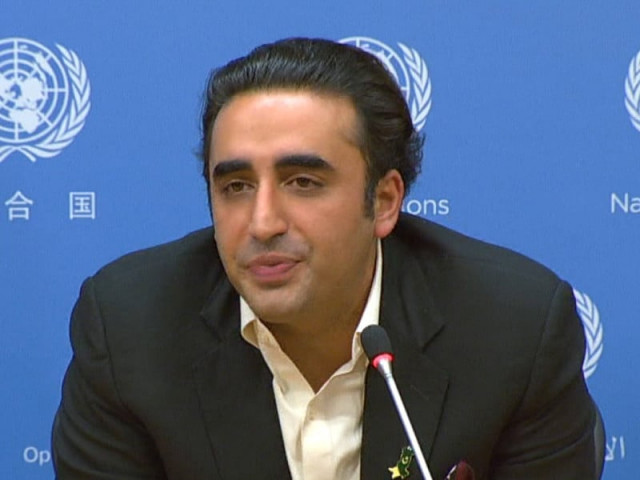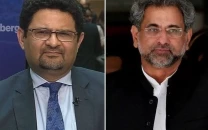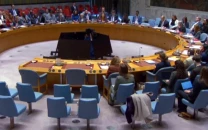Bilawal threatens opposition with solo action
PPP chief vows final bid to persuade opposition

Pakistan Peoples Party (PPP) Chairman Bilawal Bhutto Zardari has cautioned the opposition that if his one last bid to persuade them to vote for the much-touted 26th constitutional amendment failed, he would go ahead with the option of amending the Constitution with a two-thirds majority.
Addressing a public meeting in Hyderabad on Friday, organized to commemorate the October 18, 2007 Karsaz bombing, Bilawal acknowledged that such a move might end up making the amendment controversial.
"I will return to Islamabad tonight to make a final try to convince the opposition," he said. "I will request Maulana sahib [Jamiat Ulema-e-Islam (JUI-F) chief Fazlur Rehman] one last time that this Constitution was enacted by your and our elders. Let's forget today's politics, today's circumstances and conflicts for the sake of the Constitution."
Bilawal reached the stage of the public meeting around 9.15 pm, taking out time from his hectic engagements in Islamabad to build a consensus for the 26th constitutional amendment. He wore a striped shirt with pants and later delivered a 35-minute speech.
The PPP's leader humbly urged the JUI-F to send its lawmakers to cast their votes in favour of the amendment and to also try to bring Pakistan Tehreek-e-Insaf's (PTI) MNAs to the National Assembly to do the same. "But if my last attempt fails, we should pray for democracy, for the federation, for political stability and for the integrity of Pakistan."
Bilawal reiterated that the PPP and the Pakistan Muslim League-Nawaz (PML-N) government had agreed to the changes in the draft law as proposed by the JUI-F chief by giving up their demand for establishing a constitutional court in favour of a constitutional bench within the Supreme Court. He added that they had also given up their demand to include Chief Justice of Pakistan Qazi Faez Isa in that constitutional bench owing to rejection of his nomination by the opposition.
"But after all these compromises, if the opposition parties can't stand with us, I will be compelled to go with the N-league and their extra members to go ahead with the amendment," he warned.
"If the opposition shuts their door on me, then the only door which isn't the one that I like, I will be under duress to walk through it and by supporting our allies, the constitutional bench at the federal and provincial levels will have to be formed."
He hurriedly acknowledged that the two-thirds majority made amendment will fuel political instability in the country. But Bilawal questioned what they should do in the face of a rigid stance of the opposition because after having waited since 2006 for creating a constitutional court and after engaging the opposition parties in negotiations for two months, they could not wait any longer.
He warned that a consensus-based amendment will not be possible after one or two days, implying that the government will move forward with the two-thirds majority approved legislation. "I will myself table the PPP's draft for legislation in the National Assembly," he announced, repeating that he will keep trying to unite all the parliamentary parties till the last moment for consonance over the legislation.
The PPP chairman appealed to the opposition parties to realise the fact that they have to manoeuvre within whatever political space existed in Pakistan. He advised that they should all try to increase respect for the parliament, politics and politicians instead of making the citizens abuse these platforms.
He asserted that the parliamentary parties have already made a compromise over the amendment by accepting each other's recommendations and by addressing the concerns. "The amendment should be done accordingly", he said.
Bilawal elaborated his party's stance in support of the constitutional court or bench within the supreme court, likening the existing judicial system with the One Unit system of Ayub Khan. "Na khappay, na khappay, One Unit na khappay." He contended that the need for such a court or bench was not felt recently or to deal with the prevailing political conflicts but it originated as early as 1930 at the Round Table Conference when Quaid-e-Azam Muhammad Ali Jinnah spoke about it.
Later, Justice Dorab Farmrose Patel, a jurist of Parsi descent in the apex court, had floated an identical suggestion in the 1980s. Following him, former prime minister and PPP Chairperson Benazir Bhutto had also begun to demand the creation of a constitutional court. Bilawal praised Justice Patel for being a real jurist who was unlike his contemporaries who pandered to the wishes of the dictators. Justice Patel had also objected to the hanging of Zulfikar Ali Bhutto, former PM and founding leader of the PPP.
Bilawal said the recent Supreme Court judgment declaring Bhutto as innocent had also vindicated the judgment of Justice Patel against Bhutto's hanging. The PPP's leader also praised CJP Isa for giving a brave decision against the Faizabad sit-in, saying no other judge could have dared to do so. He said history would remember Justice Isa for his judgments.
The PPP chairman assured jiyalas that when they meet again on December 27 in Garhi Khuda Bux Bhutto, Larkana, for the party's annual public meeting, the One Unit which existed in the superior judiciary would have ended. He said all the provinces would be given equal representation in the constitutional court or bench.


















COMMENTS (1)
Comments are moderated and generally will be posted if they are on-topic and not abusive.
For more information, please see our Comments FAQ